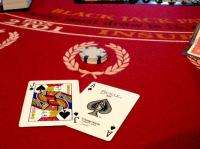Computing project combats Blackjack card counting

(PhysOrg.com) -- A University of Dundee graduate has created a computer system with the potential to make the game of Blackjack fairer by detecting card counters and dealer errors.
Kris Zutis (22) developed the system, which uses complex algorithms to analyse information captured by cameras set up in casinos, as the final year project of his Applied Computing degree. He worked closely with staff from Dundee's Gala Casino when designing the system.
The system is already attracting worldwide attention, and featured in the latest edition of the prestigious New Scientist magazine.
The positive reaction to his top-rated project has led to Kris being invited to present a research paper entitled 'Who's Counting?: Real-Time Blackjack Monitoring for Card Counting Detection' at the International Conference on Computer Vision Systems (ICVS), in Ličge, Belgium from October 13-15.
ICVS is a leading international scientific forum for developments in applications of computer vision, and attracts some of the top names in the field each year.
Kris, who was born in Latvia and moved to Tayport at the age of 10, said he hoped his at such a prestigious appearance would enable him to take the project forward.
'I'm very excited as presenting at the conference will be a fantastic experience and opportunity,' he said. 'My system needs work to be commercially viable, but the potential has been demonstrated, and hopefully appearing at the event will help generate some interest in helping me to develop it further.'
'Computer vision was one of the options when it came to choosing subjects for our final year, and when it came to our final project, I started to think about combining what I was learning with something I was interested in and was enjoyed.'
'I'm not a big gambler myself, but I do enjoy playing poker and I had originally intended my project to be related to that. It turned out that blackjack was far more suited to a computer vision system, and so I developed the system from there.'
Kris moved to Dundee when he started studying at the University, where he now works as a full-time research assistant within the School of Computing. The system he has developed detects the card counters by tracking the game as it progresses, monitoring the cards as the player does, and tracking the player's betting patterns.
Card counting is a method of tracking the cards dealt to manipulate the player's odds of winning in their favour. The correlation between the player's betting patterns and the game card count is analysed to determine the likelihood that a player is card counting, and the system alerts the Casino staff upon positive identification of a card counter.
While the strategy isn't illegal, casinos will move suspected card counters to a new table, where the counters are forced to start afresh, or eject them.
The Blackjack tracking system devised by Kris, with guidance from his project supervisor Dr Jesse Hoey, also has the ability to detect errors by monitoring dealers' actions made during the game and ascertaining whether or not the correct action was taken.
A stereo camera placed above the Blackjack table captures a live feed of the game, and software algorithms using methods such as contour analysis, template and feature matching are employed in order to recognise each card as it is dealt.
The player's bets are detected using stereo imaging, by measuring the height of the player's chip stack to determine the number of chips that are being bet. Testing was carried out by a range of users, from professional Blackjack dealers to novice players.
The system shows considerable promise for commercialisation, and could become an invaluable asset for casinos. Other devices exist to try and combat car counting that use expensive RFID chips. Kris's method offers significant cost cutting opportunities for casinos while more effectively identifying car counters and detecting dealer errors.
He says the system could theoretically be adapted to track any casino game which uses cards or chips, such as roulette or three card poker, and offer better security for customers.
Provided by University of Dundee



















